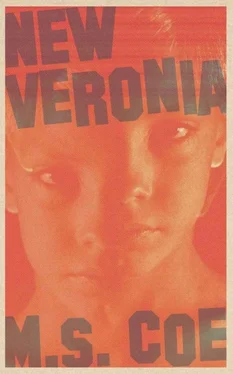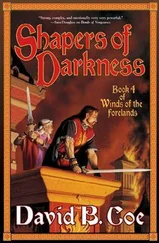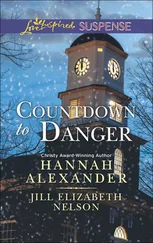My trance was finally broken when the truck slowed, probably taking an exit. “This is perfect,” Jay said. “We’ve been driving long enough that we’ve got to be in another state. And crimes don’t follow across state lines!”
“Quiet,” I said. “I think he’s almost stopped.”
“So when he goes in to pay for his gas, we slip out and run for it.”
“Where?”
“Back to the highway to catch another ride.”
“But where are we, even? We don’t know what way we have to go!” My breath was coming in gasps, and I worried all that rattling had shaken apart my nasal passages. Maybe I would never breathe right again. I had trusted Jay, trusted that he had a real plan. “Seriously, we could be any where.”
“Shut up, Bennet, don’t act like a girl.”
The movement of the truck had stopped, even though my body still felt like it was going forward.
“Here’s our chance. Here we go…” Jay lifted the tarp; everything outside was black.
In a panic, I realized that my legs had fallen asleep. “I can’t run!” I said. “I can’t run!” My throat ached from yelling quietly. “Don’t leave me, Jay; my legs don’t work!”
But Jay had already scrambled from beneath the tarp. I wiggled my toes furiously to get some feeling back down there, and then I staggered after him. I practically ran right into his back, because he stood motionless, staring at the man who must have been our driver for all those miles. We were parked in front of a clapboard house that glowed ghostly white in the night.
The man let his hand drop from where it was pressed against his heart, and then he slowly shook his head. “Now boys, don’t you worry. I’m not mad. Used to be I did the same thing at your age. Why don’t you come in and have some soup?”
The downstairs of the house lit up, and the windows cast an inviting glow out over the lawn.
“Nothing funny?” Jay said.
“Nothing funny.” The man turned and made his way towards the house, and after a couple of seconds, we followed. Pins and needles shot up and down the muscles of my legs.
After we had both used the bathroom, we followed the smell of cheddar into the kitchen, where a black woman was ladling up three bowls of soup.
Decorative plates etched with roosters were propped atop the cupboards, and the counters were crowded with cookie cutters, copper pots, and a massive spice rack. You could barely see the fridge for all the kids’ drawings that were plastered to it.
“I remember one time I planned to hitch to New York City,” the man said as he took a seat at a small, round table in a corner of the kitchen. He gestured at the other chairs and we sat; Jay tucked the backpack securely between his feet. “I had this idea that it was nice up there. But the thing is? Here was as far as I got.”
“Seems like you’re doing well for yourself,” Jay said. “You got a maid and all.” He bobbed his chin at the woman arranging little crackers around the edges of the soups. The back of her dress pulled tighter, as if she’d felt Jay’s nod and it had tensed her.
The man’s face flushed a deep red. “No maid,” he said. “That’s my wife.”
Jay laughed. I willed him to apologize, but so far as I knew, he never had, not once in his whole life. “Oh shit,” Jay said after a minute, “you’re serious? And so, what, you have little mulatto babies somewhere around here?”
“Hey, now,” the man said, “you’re in my house.”
If Jay went for the gun, he’d have to unzip the backpack first; I’d have time to stop him.
“I thought you kids today were supposed to be progressive,” the man said. His wife kept her back to us; her hands clenched the edge of the countertop. “Not small-minded bastards.”
Jay knocked his chair to the ground with the force of his standing up. “We’re out of here. I wouldn’t eat that slop anyhow.”
I grabbed the backpack that had become entangled with the chair legs and followed Jay towards the door. On the way there, he pushed over a vase, and a moment after it crashed, a kid started wailing piteously from somewhere on the second floor.
Beside the road, we broke through the underbrush and went a quarter mile back among the trees.
“Give me that backpack,” Jay said. “What are you doing with this? You don’t touch it. Only I touch it.”
“I didn’t want to leave it behind,” I said as I handed it over.
Jay stopped at a part of the woods that looked like all the other parts. “We’ll bed down here for the night. Make a little shelter. It will kind of be like New Veronia.”
The comparison made my stomach clench: New Veronia was what had gotten us into this mess. “What if they come looking for us? We’re a little close, don’t you think?”
“They won’t do that,” Jay said. “They’re ashamed of themselves, is what they are, and they know I’m right. That flower pot I broke was a cheap piece of shit, anyhow. How many kids you think they have? Mixed up, is what those kids’ll be. You and me, we have that advantage, at least.”
But right then, I felt like every advantage had fled me, and a fierce jealousy for the children in their beds in that cozy house raged in my chest. “I wanted real food,” I said. “The soup…”
“We got plenty of money. I’ll buy you soup at the next place we find.” He put me to work clearing stones, and all the while he was gathering branches, he murmured about why we had it better, why we would survive.
Without Jay talking sense to me, I would have fallen apart—though it was what Jay had done in the first place making me feel like I couldn’t hold it together. Each day with him seemed to compound the craziness of our lives. But I was only making it worse thinking this way; instead, I needed to follow some advice from the bible, a quote that really struck me as the best way to get by: “Do not worry about tomorrow, for tomorrow will worry about itself. Each day has enough trouble of its own.” So I guess a lot of people have felt this same way.
Once we’d made a little place to bed down for the night, I said, “Jay, how much money do we have, anyhow?”
He stuck his hand in the pocket with the money; he was calm and collected, just as if he hadn’t pulled off his first armed robbery a few hours before. “Let me count.” He sorted through the bills twice, holding them close to his eyes, tilting them towards the moonlight. “Two hundred and fifty-eight bucks.”
“Huh.” This amount seemed pretty huge, and for a minute, I thought that maybe we did have it better than those stupid kids in their warm beds with their mother to cook them breakfast: we were rich. But then I shifted against the hard ground and something sharp poked my back.
“Doesn’t it feel weird?” I said. “Spending the night somewhere, but we have no idea where it is. What state it is, even.”
“Not that weird. Think about it, Bennet: how many places have you been that you’ve really felt at home in? Or that you’ve really understood?”
Sometimes Jay surprised me with his serious ideas. Maybe they were always floating around in there, ready to make a point, but he only let them out when I needed to hear them most.
I couldn’t sleep. Dry leaves worked their way up the sleeves of my shirt and bugs—either real or imagined—tickled the back of my neck. Jay, who had passed out immediately, kept inching his butt up against mine, and so I kept scooching away. The Zimzee loved to find more than one boy together, and he could sense badness: if the monster was real, then Jay and I were the perfect targets. I tried to force my thoughts elsewhere—what if thinking of the Zimzee so much gave him power, embodied him, somehow—but I couldn’t help myself. The dark reverted me back to being a scared little kid.
Читать дальше












